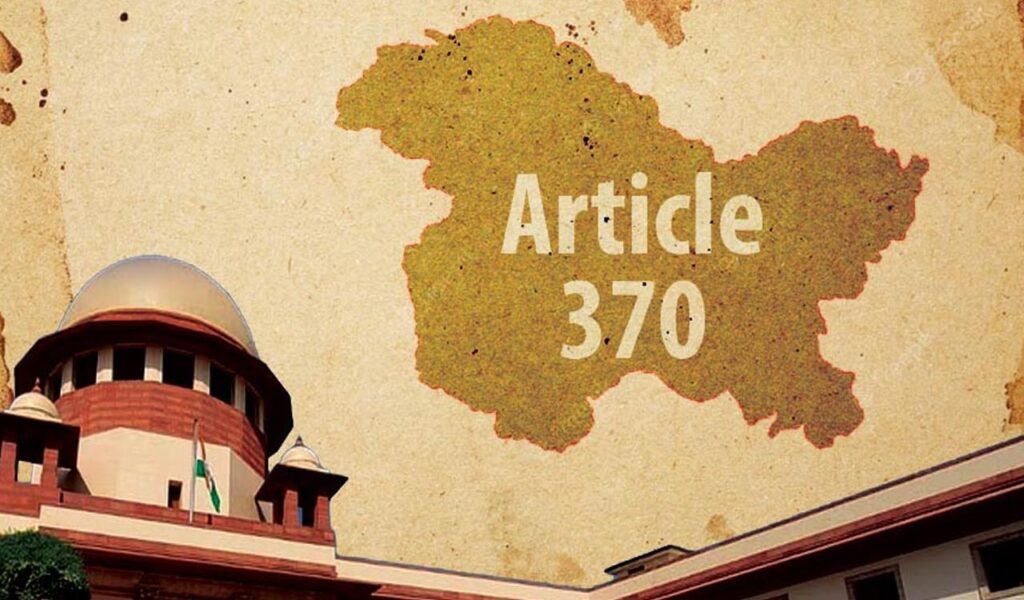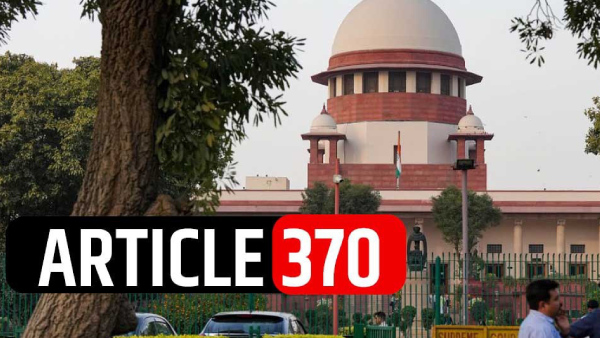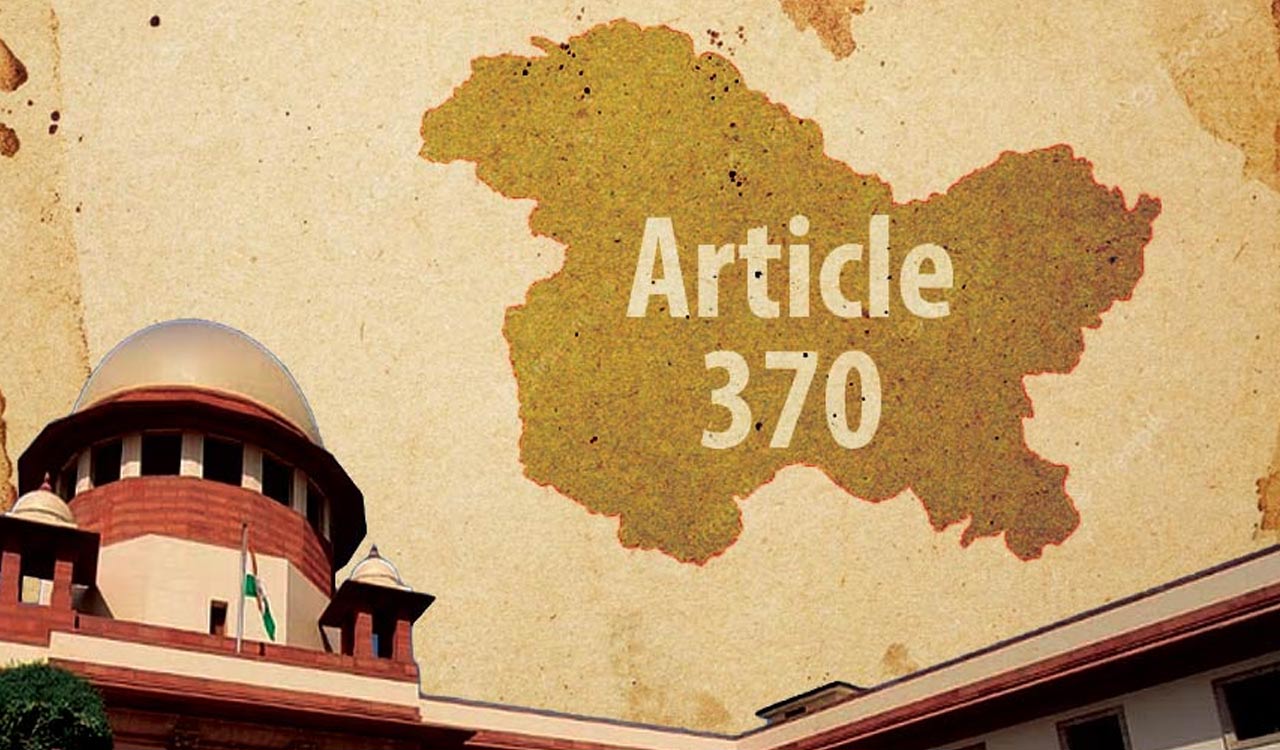Article 370

Article 370: A Controversial Provision Shaping Kashmir’s Future
Introduction:
Article 370, a temporary provision in the Indian Constitution, has long been a source of controversy and debate. It granted special autonomous status to the state of Jammu and Kashmir, setting it apart from other Indian states. In 2019, the Indian government revoked most provisions of Article 370, a move that continues to have significant repercussions.
The History of Article 370:
Article 370 was incorporated into the Indian Constitution in 1949, following the accession of Jammu and Kashmir to India. The Instrument of Accession, signed by the Maharaja of Kashmir, detailed the terms and conditions of this accession. Article 370 enshrined these conditions within the Constitution, granting Jammu and Kashmir a unique status within the Indian union.
Key Features of Article 370:
- Limited Applicability of Central Laws: Central laws could not be automatically applied to Jammu and Kashmir. They required the concurrence of the state’s constituent assembly, allowing for significant autonomy in legal matters.
- Separate Constitution: Jammu and Kashmir possessed its own constitution, alongside the Indian Constitution, with some overlapping and contrasting provisions.
- Legislative Autonomy: The state legislature had a greater degree of autonomy in law-making compared to other Indian states.
- Protection of Land Rights: Article 370 also protected the land rights of the state’s citizens, preventing outsiders from purchasing property in Jammu and Kashmir.
Controversy and Debate:
The special status granted to Jammu and Kashmir under Article 370 has long been a subject of intense debate. Proponents argued that it was necessary to preserve the unique identity and heritage of the state, while others felt that it hindered the state’s full integration into India.
Revocation of Article 370:
In August 2019, the Indian government, led by the Bharatiya Janata Party (BJP), revoked most provisions of Article 370. This move was met with widespread protests and criticism from many, including Kashmiri political parties, human rights groups, and international organizations.
Latest News and Developments:
The revocation of Article 370 has had a significant impact on the region. Some of the latest developments include:
- Supreme Court Hearing: The Supreme Court of India is currently hearing a batch of petitions challenging the abrogation of Article 370. A five-judge bench heard the arguments from various parties and reserved its verdict on December 11, 2023. The court’s decision is eagerly awaited and could have major implications for the future of Jammu and Kashmir.
- Political Landscape: The political landscape of Jammu and Kashmir has changed significantly following the revocation of Article 370. The BJP, which had long advocated for its abrogation, has strengthened its grip on the region. However, traditional Kashmiri parties continue to oppose the move and demand its restoration.
- Economic Development: The government has announced several plans to boost economic development in Jammu and Kashmir. However, the region continues to face challenges, such as high unemployment and limited infrastructure.
- Human Rights Concerns: There have been concerns about human rights violations in Jammu and Kashmir since the revocation of Article 370. These include allegations of arbitrary arrests, detentions without trial, and excessive use of force.
Conclusion:
The future of Article 370 remains uncertain. While the Supreme Court’s decision is likely to be a significant factor, the long-term consequences of the revocation are still unfolding. The situation in Jammu and Kashmir remains complex, with ongoing political and social challenges. It is crucial to closely monitor the developments in the region and strive for a peaceful and sustainable resolution that respects the rights and aspirations of all Kashmiris.
In addition to the information provided above, here are some additional resources that you may find helpful:
- The Instrument of Accession: https://www.toppr.com/ask/question/jammu-and-kashmir-has-a-constitution-framed-by/
- Article 370 of the Indian Constitution: https://currentaffairs.adda247.com/what-is-article-370-of-the-constitution-of-india/
- Supreme Court Hearing on Article 370: https://www.ndtv.com/topic/article-370
This article is intended to provide an overview of Article 370 and its historical, legal, and political context. It is crucial to consult a variety of sources and perspectives to gain a comprehensive understanding of this complex issue.

Demystifying Article 370: A Journey Through History and Controversy in 2023
Article 370, a temporary provision of the Indian Constitution, has been a source of intense debate and controversy for decades. This provision, which granted special autonomous status to the state of Jammu and Kashmir, stands revoked as of August 5, 2019. However, its legacy and the ongoing legal challenges continue to shape the region’s political and social landscape.
A Look Back: Historical Context and Key Features:
Incorporated into the Constitution in 1949, Article 370 followed the Instrument of Accession signed by the Maharaja of Kashmir, outlining the terms of the state’s joining India. This article granted Jammu and Kashmir unique features:
- Limited Applicability of Central Laws: The central government could not automatically apply its laws to Jammu and Kashmir. The state’s concurrence was needed, giving them significant legal autonomy.
- Separate Constitution: The state had its own constitution alongside the Indian Constitution, with some overlapping and contrasting provisions.
- Legislative Autonomy: The state legislature enjoyed a greater degree of autonomy in law-making compared to other Indian states.
The Controversies and Debates:
- Erosion of Autonomy: Critics argued that the central government had gradually eroded the intended autonomy of Jammu and Kashmir, undermining the spirit of Article 370.
- Integration vs. Autonomy: Supporters of Article 370 emphasized the need for preserving the unique identity and heritage of Jammu and Kashmir, while others argued that it impeded the state’s full integration into the Indian union.
- Allegations of Misuse: There were accusations that the state government exploited the special status for their own political benefit, leading to corruption and discrimination.
- Impact on National Security: Concerns arose about Article 370’s potential impact on national security, particularly in the context of terrorism and separatist movements.
The Historic Revocation and its Aftermath:
In 2019, the Indian government took the controversial step of revoking most provisions of Article 370, ending the special status of Jammu and Kashmir. This move sparked widespread protests and criticism within the region and abroad, raising concerns about human rights violations and potential instability.
The revocation has led to significant social and political changes in Jammu and Kashmir. The region continues to face complex issues such as:
- Political Marginalization: Concerns persist regarding the political representation and participation of Kashmiris in the Indian union.
- Economic Stagnation: The revocation’s impact on the region’s economy is a cause for concern, with unemployment and poverty remaining high.
- Continued Security Challenges: Terrorism and separatist movements continue to pose challenges to security and stability in the region.
Latest Developments and Ongoing Legal Challenges:
As of December 2023, the following key developments are ongoing:
- Supreme Court Verdict: The Supreme Court reserved its verdict on December 11, 2023, on a batch of pleas challenging the abrogation of Article 370. The verdict is expected to have significant implications for the region’s future.
- Political Tensions: Political tensions remain high in Jammu and Kashmir, with regional parties and separatist groups opposing the central government’s policies.
- Development Initiatives: The Indian government has undertaken various development initiatives in Jammu and Kashmir, aiming to improve infrastructure, connectivity, and economic opportunities.
Conclusion: A Complex Legacy and an Uncertain Future:
Article 370 remains a potent symbol of the region’s unique status and identity within India. Its revocation has sparked an ongoing legal battle and continues to shape the region’s political and social landscape. As the Supreme Court prepares to deliver its verdict and the political and security situation evolves, the future of Jammu and Kashmir remains uncertain. Understanding the complex legacy of Article 370 is crucial for navigating the region’s complex challenges and charting a course for its future.

Demystifying Article 370: A Journey Through History and Controversy (Updated October 27, 2023)
Article 370, a temporary provision of the Indian Constitution, has long been a subject of intense debate and controversy. This article granted special autonomous status to the state of Jammu and Kashmir, making it a unique entity within the Indian union. Understanding the history, complexities, and implications of this article is crucial for comprehending the ongoing political and social dynamics of the region.
Article 370 was incorporated into the Constitution in 1949, following the accession of Jammu and Kashmir to India. The Instrument of Accession, signed by the then Maharaja of Kashmir, outlined the terms and conditions of this accession, and Article 370 enshrined these conditions within the Constitution.
Key Features of the Article:
- Limited Applicability of Central Laws: Central laws could not be automatically applied to Jammu and Kashmir. They required the concurrence of the state’s constituent assembly, granting significant autonomy in legal matters.
- Separate Constitution: Jammu and Kashmir possessed its own constitution, alongside the Indian Constitution, with some overlapping and contrasting provisions.
- Legislative Autonomy: The state legislature enjoyed a greater degree of autonomy in law-making compared to other Indian states.
- Protection of Land Rights: Article 370 also prevented non-residents from purchasing land in Jammu and Kashmir, aiming to protect the demographic composition of the region.
Controversies and Debates:
- Erosion of Autonomy: Critics of Article 370 argued that over time, the central government had eroded the intended autonomy of Jammu and Kashmir, undermining the spirit of the article.
- Integration vs. Autonomy: Proponents of Article 370 emphasized the need for preserving the unique identity and heritage of Jammu and Kashmir, while others argued that it impeded the state’s full integration into the Indian union.
- Allegations of Misuse: Some critics accused the state government of exploiting the special status for their own political benefit, leading to corruption and discrimination.
- Impact on National Security: Concerns were raised about Article 370’s potential impact on national security, particularly in the context of terrorism and separatist movements.
The Historic Revocation:
In 2019, the Indian government took the controversial step of revoking most provisions of Article 370, effectively ending the special status of Jammu and Kashmir. This move was met with widespread protests and criticism within the region and abroad, raising concerns about human rights violations and potential instability.
The Aftermath and Ongoing Challenges:
The revocation of Article 370 has sparked significant social and political changes in Jammu and Kashmir. The region continues to grapple with complex issues such as political marginalization, economic stagnation, and continued security concerns. The region has witnessed an influx of non-residents, raising concerns about the changing demographics and the potential erosion of the region’s unique cultural identity.
Latest News (October 27, 2023):
- Supreme Court to Deliver Verdict on Article 370: The Supreme Court of India is scheduled to deliver its verdict on a batch of petitions challenging the abrogation of Article 370 on December 11, 2023. The verdict is highly anticipated and could have significant implications for the future of Jammu and Kashmir.
- Increased Security Initiatives: The Indian government has intensified security measures in the region in response to recent incidents of violence. This includes increased deployment of security personnel and stricter surveillance measures.
- Concerns about Human Rights Violations: International human rights organizations have continued to express concerns about alleged human rights violations in Jammu and Kashmir, including restrictions on freedom of speech and assembly.
- Political Uncertainty: The political landscape in Jammu and Kashmir remains uncertain, with various political parties and groups demanding greater autonomy or even complete independence.
Conclusion:
Understanding Article 370 requires acknowledging its historical context, complexities, and the ongoing debates surrounding it. This provision remains a potent symbol of the region’s unique status within India, and its legacy will continue to influence the social, political, and economic landscape of Jammu and Kashmir for years to come. It is crucial to stay informed about the latest developments and continue to engage in constructive dialogue to find a lasting solution for the region.

For more article like this please click on this link https://stationvidya.com/unemployment-types-of-unemployment-unemployment-rate-causes/

Leave a Reply